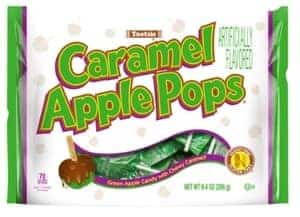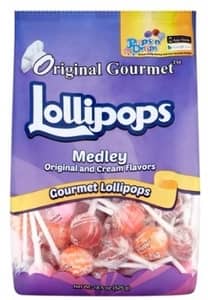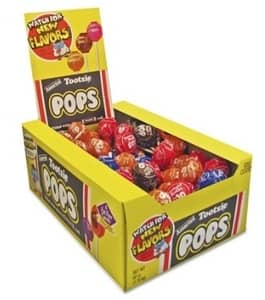I’ve written about a couple of specific lollipops before, but there are countless varieties on the market each with their own ingredients. So, in this article, we’ll be covering the vegan-friendliness of lollipops in general and whether or not there are any ingredients you need to look out for.
Are they vegan? Yes, lollipops tend to be vegan. Hard candies are among the oldest types of confections and are made up of little more than sugar and water boiled together until little water is left, leaving a glassy non-crystalline solution.1
Note that this applies to plain lollipops. There are a number of variations of the original recipe (think cream pops, etc.), where animal products can be used. But, the most basic form of lollipop is vegan.
Here, we’re addressing generic lollipops.
For specific brands and their vegan-friendliness, check out:
- The article on Dum Dums.
- The one on Chupa Chups.
- The article on Tootsie Pops.
Why Most Traditional Lollipops Are Considered Vegan
Sugar is the main ingredient in the standard lollipop.2
When exposed to enough heat, the molecules break apart generating complex color and flavor changes and creating a nice aroma.3
It is true that the strictest of vegans try to avoid processed foods that don’t contain organic sugar. That’s because most non-organic sugar, both white and brown, can be processed with bone char.
Animal bone char has long been used as a sugar refining agent to decolorize and de-ash cane sugar to remove color impurities.
When bone char is used, it tends to be used in large quantities because the substance has a low decoloration capacity.4
Removing impurities is beneficial to manufacturers because it reduces the amount of scaling needed later on in the refining process.5
The vegan community at large does not seem to consider the presence of processed sugar to render foods unsuitable for vegan consumption.
For one, not all sugar is processed with bone char. It is likely that most white sugar in the US is processed with the stuff, nowadays there are several alternatives for manufacturers to choose from such as activated carbon and ion-exchange resins.6
For another, most vegans just don’t seem to scrutinize processed sugar too heavily, regardless of how it’s produced. Vegan advocacy groups and organizations like PETA discourage us from being too strict in this area.7 You can read about their position here.
While I have known vegans to avoid purchasing processed sugar in bulk, especially when there’s organic sugar sitting right next to it in grocery stores, I’ve personally never known anyone to avoid sugar-containing processed foods due to bone char concerns.
.I’ve seen some websites be quite contradictory in this area, writing one article praising the accidentally vegan sugar-containing Oreo only to turn around and write an article on how some sugar isn’t vegan.
I’m sure they have good intentions, but wow is that confusing to readers. My personal policy is that I don’t buy non-organic sugar—i.e. when buying sugar as a bulk ingredient for home use—but I do eat sugar containing foods like Oreos and drink the occasional soda.
For those of you who are extra prudent and don’t want to consume processed sugar, there are several organic lollipops on the market, that use only organic sugar.
For example, YumEarth Organic Fruit Pops contain:8
- Organic Cane Sugar
- Organic Brown Rice Syrup
- Citric Acid and Ascorbic Acid
- Natural Flavors
- Natural Colors – Organic Carrot, Blackcurrant, Apple, Blackcurrant, Turmeric, and Annatto
Besides sugar, the only other basic ingredient needed in lollipop manufacturing is water, though the moisture content drops to a low 2% by the time the processing is over.2
All other ingredients are optional. Most lollipops will have certain organic acids (e.g. citric and malic), but these are vegan.
I’ve seen root beer flavored lollipops with lactic acid. It’s common to get lactic acid and lactose confused with each other because lactose (the non-vegan milk sugar) can be used to generate lactic acid. However, industrially lactic acid tends to be made with LA-producing bacteria, so it’s usually 100% vegan.9
The only exception is when the LA-producing cultures are fed on a diet of galactose, which may not be plant-based.
But, LA is generally seen as a vegan-friendly ingredient because galactose can be derived from vegetables like beets.10
Then there are the food colorings to consider.
The most notorious non-vegan food colorant is carmine, a red pigment derived from beetles via carminic acid.11,12
Fortunately, lollipop manufacturers tend to use Red 40 and Red 3, both of which are petroleum-derived and thus vegan. I’ve scanned countless labels, and have never run across Red 4 (carmine) in this particular category of confections.
You’d be much more likely to run across it in yogurt, which is already a non-vegan food. I have seen it in certain soft/chewy candies like Mentos Rainbow Roll, but haven’t found it in any hard candy.13
You’ll want to keep an eye out for it, but the ingredient has never been an issue with hard candy to my knowledge.
Non-Vegan Ingredients Common in Some Lollipops
These will be easy to spot because their presence will be evident in the description.
Caramel

Milk products can take several forms.
I used to love caramel apple lollipops growing up. It’s a green apple-flavored hard sucker with caramel stuck to it.
A common one is Syberg’s Caramel Apple Pops which contains:14
- Corn Syrup and Sugar
- Palm Oil
- Dry Whole Milk
- Malic Acid
- Whey (Milk Protein)
- Artificial Flavors
- Salt
- Turmeric (Color)
- Soy Lecithin
- Artificial Colors (Blue1 and Red 40)
Cream

Another popular milk-containing form of lollipop is what some refer to as cream pops. Think orange and cream, berries and cream, etc. Vanilla usually spells trouble too.
For example, Original Gourmet Medley Cream Lollipops contain:15
- Sugar and Corn Syrup
- Cream (Milk)
- Coconut Oil
- Natural And Artificial Flavors
- Soy Lecithin
- Artificial Color (Reds 3 and 40, Blues 1 and 2, Yellows 5 and 6
- Glycerin
- Hydrogenated Cottonseed Oil
- Dextrose
- Buffered Lactic Acid
- Water
- Salt
Also, chocolate-flavored lollipops also tend to contain milk.
Condensed Milk

Yep, Tootsie Pops. The tasty taffy-like candy is mostly sugar and condensed milk.
Grey Area Ingredients
Glycerin is a common ingredient in lollipops and is a red flag for some in the community. It is mentioned in PETA’s list of animal-derived ingredients as a potentially problematic additive.16
This one is a grey area because the ingredient is a derivative of glycerol which is commonly sourced from both plants and animals.17
Like with mono- and diglycerides, consuming products containing glycerin does not make you a non-vegan. But, if you want to be extra careful you can always go with lollipops that don’t contain the stuff.
For example, Dum Dums (assorted flavors) don’t contain glycerol in any form.18
That’s it for the vegan status of lollipops. Thanks for reading.
You may also want to check out the following related articles:
References
- Chocolates and Confections: Formula, Theory, and Technique For the Artisan Confectioner (Page 223). Peter Greweling-Ben Fink – John Wiley & Sons – 2013
- Lollipops. https://en.wikipedia.org/wiki/Lollipop
- McGhee, Harold (2004). On Food and Cooking. Scribner. pp. 647–712.
- Asadi, Mosen (2006). Beet-Sugar Handbook. Hoboken: John Wiley & Sons. p. 333. ISBN 9780471790983.
- Chou, ed. by Chung Chi (2000). Handbook of sugar refining : a manual for the design and operation of sugar refining facilities. New York, NY [u.a.]: Wiley. pp. 368–369. ISBN 9780471183570.
- Bone Char. https://en.wikipedia.org/wiki/Bone_char
- Is Sugar Vegan? https://www.peta.org/living/food/is-sugar-vegan/
- Yumearth Organic Fruit Pops Vitamin C 8.5 Oz (40lp). Holls- Vicky- Jesussaved – https://www.walmart.com/ip/YumEarth-Organic-Fruit-Pops-Vitamin-C-8-5-oz-40LP/26971903
- H. Benninga (1990): “A History of Lactic Acid Making: A Chapter in the History of Biotechnology”. Volume 11 of Chemists and Chemistry. Springer, ISBN 0792306252, 9780792306252
- Galactose. https://en.wikipedia.org/wiki/Galactose#Sources
- Bug-Based Food Dye Should Be Exterminated, Says CSPI. https://cspinet.org/news/bug-based-food-dye-should-be-exterminated-says-cspi-20060501
- Carminic Acid https://en.wikipedia.org/wiki/Carminic_acid
- Mentos Rainbow Roll. https://www.mentos.co.uk/mentos-rainbow-roll
- Syberg’s Caramel Apple Pops, 9.4 Oz. Kev – https://www.walmart.com/ip/Syberg-s-Caramel-Apple-Pops-9-4-Oz/354595520
- Original Gourmet Medley Original and Cream Lollipops, 18.5 Oz, 50 Ct. Heather- SouthCarolina – https://www.walmart.com/ip/Original-Gourmet-Medley-Original-and-Cream-Lollipops-18-5-Oz-50-Ct/42348192
- Animal-derived Ingredients Resource: Living. https://www.peta.org/living/food/animal-ingredients-list/
- Glycerol Synthesis. https://en.wikipedia.org/wiki/Glycerol#Synthetic_glycerol
- Dum-dum Original Pops, 10.7 Lb., 1,000 Count. Jbrmurray – https://www.walmart.com/ip/Dum-Dum-Original-Pops-10-7-Lb-1-000-Count/52900789

